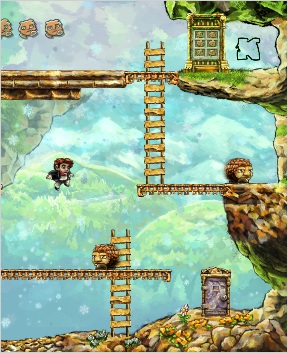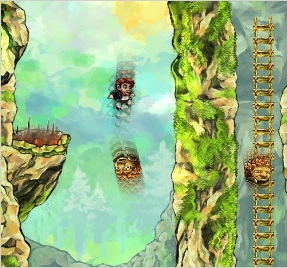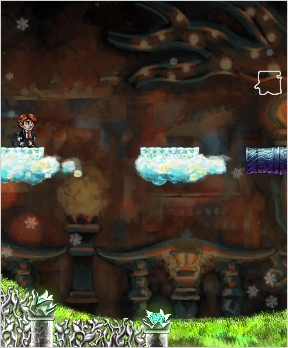![]() When you read something, you usually retain some sort of information from the words you've seen. After a few seconds or minutes of reading, you've amassed a bit of knowledge and can find ways to apply it. But what if the flow of time wasn't linear?
When you read something, you usually retain some sort of information from the words you've seen. After a few seconds or minutes of reading, you've amassed a bit of knowledge and can find ways to apply it. But what if the flow of time wasn't linear?  What if you could obtain that knowledge, then go back and use it in situations long before you started reading? This is one of the key concepts Braid, a puzzle platformer created by Jonathan Blow, is built upon. With a deep, intriguing storyline, gorgeous watercolor backgrounds, enchanting music, and the unique ability to manipulate time, Braid is built from dozens of unique puzzles (no filler material) that will challenge your ability to think laterally while inspiring your philosophical mind to search for meaning with every object you encounter.
What if you could obtain that knowledge, then go back and use it in situations long before you started reading? This is one of the key concepts Braid, a puzzle platformer created by Jonathan Blow, is built upon. With a deep, intriguing storyline, gorgeous watercolor backgrounds, enchanting music, and the unique ability to manipulate time, Braid is built from dozens of unique puzzles (no filler material) that will challenge your ability to think laterally while inspiring your philosophical mind to search for meaning with every object you encounter.
As you begin the game, you'll notice how Braid feels like your ordinary platformer. Run, climb, jump, and bounce off the heads of enemies, all in the name of collecting a puzzle piece. The story even seems to involve rescuing a princess! However, the significant twist (and oh, what a twist it is) is... time.  Almost every puzzle in this game requires you to manipulate time to some extent, whether it be through trial-and-error or altering the speed or direction that time flows. Holding down the [shift] key will move time backwards, letting you undo an action (such as dying) to let you have a new perspective on what you've just done.
Almost every puzzle in this game requires you to manipulate time to some extent, whether it be through trial-and-error or altering the speed or direction that time flows. Holding down the [shift] key will move time backwards, letting you undo an action (such as dying) to let you have a new perspective on what you've just done.
Part of the journey Braid takes you on is the thrill of discovering how time moves uniquely in each world. That much said, we'll try not to spoil too many of the twists for you, but we will offer you this advice: with probably 99% of the games you've played in your life, time has marched on steadily, and there's been nothing you can do about it. The clock has always ticked down, the bonus points have slowly decreased, and the desire to keep moving just for the sake of moving has plagued you. If you want to succeed with Braid, don't let this happen. The one mechanism you've never been allowed to tamper with is now your biggest tool for solving each puzzle. Think of how time can be used in that world, and how it can be applied to each specific task. If all else fails and you get completely stuck, take a break. Time is on your side, after all.
Jonathan Blow's puzzle of time won't just twist your mind with its new style of mental gymnastics, but features enough gorgeous eye-candy to leave you craving more. Each pixel is coated with pure awesome and served with a warm cup of stunning. The music and sounds not only serve as a soundtrack for your adventure, but almost become a manipulable toy by themselves, able to be twisted as you play with time. However, one of the truly astonishing aspects of this game is the deeply involving story, which sweetly lures you in at the beginning, and blows your mind as you travel onward.

![]() To say that Braid is breathtaking is a massive understatement. If it doesn't change the way you think about games as tools of expression, you're missing out on more than half the experience. In creating Braid, Jonathan Blow knew that a video game would be the only suitable medium to tell the story. Why? Because games are interactive, they create a unique bridge crossing the gap between player and game. Reading or watching movies is a passive experience, whereas games are active. Blow played with this in a number of ways, toying with the player in such a way that the interaction between you and Braid becomes a story (and a game) on its own.
To say that Braid is breathtaking is a massive understatement. If it doesn't change the way you think about games as tools of expression, you're missing out on more than half the experience. In creating Braid, Jonathan Blow knew that a video game would be the only suitable medium to tell the story. Why? Because games are interactive, they create a unique bridge crossing the gap between player and game. Reading or watching movies is a passive experience, whereas games are active. Blow played with this in a number of ways, toying with the player in such a way that the interaction between you and Braid becomes a story (and a game) on its own.
One of the biggest points of discussion in Braid is its story, and there are as many theories on its meaning as there are people to play the game. What has Tim done that he regrets so much? Who is the princess, what does she represent? And what's this about an atomic bomb? After completing Braid for the first time, I went back and replayed the entire thing with a friend, picking apart every little sprite and event, watching enemies spout from cannons and wondering if their direction or position carried a deeper meaning. Of course it was all just speculation on our parts (and a little presumptuous, too), but how many games burrow themselves into your mind that deeply? How many spark such long, deep and engaging conversations outside of the game itself? Very, very few, and for that alone, Braid deserves high praise.
 On the surface, Braid's story is about regret, mistakes, and learning from each one. The ability to manipulate time is something all of us have wished we could do. Imagine going on your first date with the ability to reverse time! In Braid's case, not only are we erasing mistakes we have made (stepping on spikes, falling off a platform, etc.), but we, as players, retain the knowledge of making the mistake when we repeat the action. All the regret of losing a life and restarting a level is gone. Braid also plays with a number of gaming conventions, particularly those made famous by the Super Mario Bros. series, to make you think you'll experience a classic video game scenario (rescuing the princess, anyone?) before turning everything on its head. It's "wow" from so many levels.
On the surface, Braid's story is about regret, mistakes, and learning from each one. The ability to manipulate time is something all of us have wished we could do. Imagine going on your first date with the ability to reverse time! In Braid's case, not only are we erasing mistakes we have made (stepping on spikes, falling off a platform, etc.), but we, as players, retain the knowledge of making the mistake when we repeat the action. All the regret of losing a life and restarting a level is gone. Braid also plays with a number of gaming conventions, particularly those made famous by the Super Mario Bros. series, to make you think you'll experience a classic video game scenario (rescuing the princess, anyone?) before turning everything on its head. It's "wow" from so many levels.
Each puzzle in Braid is unique, there's no copy/paste filler material, so instead of memorizing how to pass a certain obstacle and applying that knowledge later on, you only learn how to play the game, which means manipulating time and allowing it to manipulate you. The different time mechanics as you progress through the worlds — from simple rewinding to shadow characters and so on — can also be interpreted in the light of the mistakes/regret theme of the story. What if you could just take a step backwards and undo what you just did? The unique nature of the puzzles led me to believe there had to be some sort of meaning encapsulated within each. The final, greatest puzzle in Braid is its story, and that one, I'm afraid, isn't meant to be solved.
If you're in the mood to be intrigued by a game, Braid is for you. If you want some fodder for the next "games are/aren't art" argument you find yourself trapped in, Braid is required playing material. Don't use a walkthrough for this game, just play through it, experiment, and enjoy the thrill of working out the puzzles on your own. When you reach the last level, it will be one of the most emotionally stunning moments you will ever experience in a game.
![]() Windows:
Windows:
Download the demo
Get the full version
Note: Braid's music is a collection of songs from a number of independent composers. Check out the soundtrack on the official Braid blog. Also, if you're interested in Braid's story and its various interpretations, this story FAQ summarizes some of the themes and meanings.






Walkthrough Guide
(Please allow page to fully load for spoiler tags to be functional.)
We've just finished a complete walkthrough for Braid showing you how to get all the puzzle pieces, and the extra text in the epilogue!
The walkthrough can be found here
Posted by: Kero |
June 7, 2009 7:33 PM
|
June 7, 2009 7:33 PM